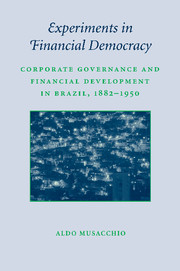 Experiments in Financial Democracy
Experiments in Financial Democracy Book contents
- Frontmatter
- Contents
- List of Figures and Tables
- Preface
- Acknowledgments
- 1 Introduction
- 2 Financial Development in Brazil in the Nineteenth Century
- 3 The Stock Exchange and the Early Industrialization of Brazil, 1882–1930
- 4 The Foundations of Financial Democracy: Disclosure Laws and Shareholder Protections in Corporate Bylaws
- 5 Voting Rights, Government Guarantees, and Ownership Concentration, 1890–1950
- 6 Directors, Corporate Governance, and Executive Compensation in Brazil, c. 1909
- 7 Bond Markets and Creditor Rights in Brazil, 1850–1945
- 8 Were Bankers Acting as Market Makers?
- 9 What Went Wrong after World War I?
- 10 The Rise of Concentrated Ownership in the Twentieth Century
- 11 Conclusion
- Bibliography
- Index
- STUDIES IN MACROECONOMIC HISTORY
5 - Voting Rights, Government Guarantees, and Ownership Concentration, 1890–1950
Published online by Cambridge University Press: 30 January 2010
- Frontmatter
- Contents
- List of Figures and Tables
- Preface
- Acknowledgments
- 1 Introduction
- 2 Financial Development in Brazil in the Nineteenth Century
- 3 The Stock Exchange and the Early Industrialization of Brazil, 1882–1930
- 4 The Foundations of Financial Democracy: Disclosure Laws and Shareholder Protections in Corporate Bylaws
- 5 Voting Rights, Government Guarantees, and Ownership Concentration, 1890–1950
- 6 Directors, Corporate Governance, and Executive Compensation in Brazil, c. 1909
- 7 Bond Markets and Creditor Rights in Brazil, 1850–1945
- 8 Were Bankers Acting as Market Makers?
- 9 What Went Wrong after World War I?
- 10 The Rise of Concentrated Ownership in the Twentieth Century
- 11 Conclusion
- Bibliography
- Index
- STUDIES IN MACROECONOMIC HISTORY
Summary
The degree to which shareholder protections mattered in practice to smaller investors should be reflected in tangible outcomes such as low levels of concentration in ownership and control in large Brazilian corporations. Ownership concentration is a good indication of the state of shareholder protections for at least two reasons. One, smaller investors unsure of the degree to which they are protected against the abuses of managers or other shareholders would be unlikely to participate actively in equity markets. Two, in the presence of weak shareholder protections there would be little to stop managers from pilfering company resources. Ownership concentration would compensate for inadequate shareholder protections because large shareholders with large blocks of votes would have more incentive to monitor managers and the power to dismiss and name new ones to replace any who committed abuses.
This chapter uses data on ownership concentration for a sample of some of the largest Brazilian corporations between 1890 and 1940 to show that corporations with more protective shareholder rights in their bylaws had lower concentration of ownership than the average company. Statistical analysis of the data on ownership concentration reveals that in companies that limited the power of large shareholders through voting provisions, such as maximum votes, the concentration of ownership and control rights (votes) was significantly lower than for the average Brazilian company.
The fact that bylaws protective of small shareholders might have reduced ownership concentration in some of the largest corporations in Brazil helps to explain why there was lower concentration of voting power in the hands of large shareholders of publicly traded corporations in the past than today.
- Type
- Chapter
- Information
- Experiments in Financial DemocracyCorporate Governance and Financial Development in Brazil, 1882–1950, pp. 105 - 134Publisher: Cambridge University PressPrint publication year: 2009


